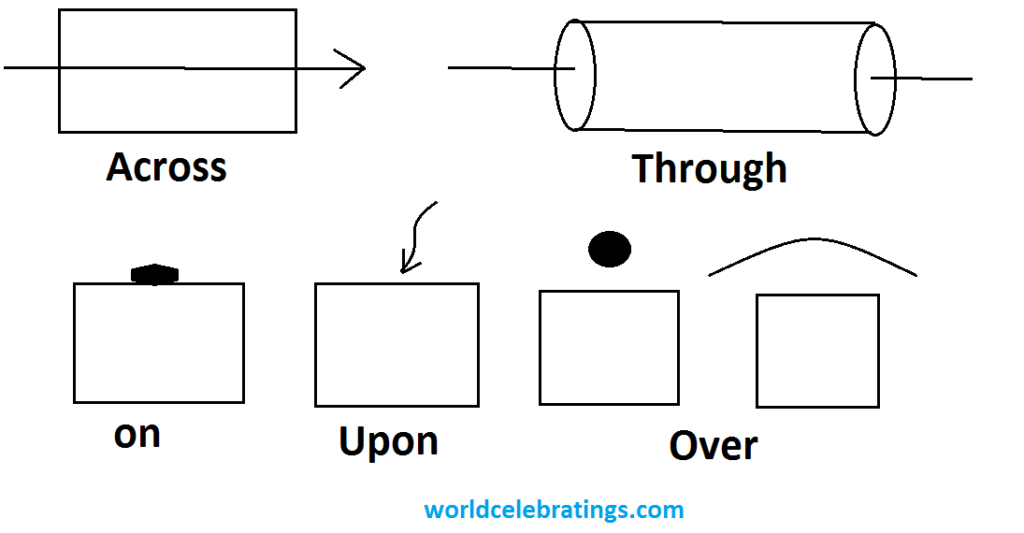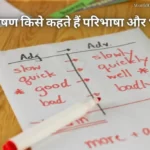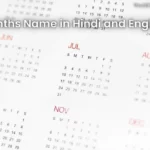Preposition in Hindi: यहाँ पर हमने Prepositions की Definition, Meaning, Example के साथ पूरी जानकारी दी है. Preposition को हिंदी में संबंध सूचक अव्यय/पूर्वसर्ग कहा जाता है. यह शब्द pre + Position से मिलकर बना हुआ है. इसमें Pre का मतलब होता है पहले तथा Position का मतलब होता है स्थिति.
परिभाषा- Preposition ऐसे word होते हैं जो कि noun और Pronoun के पहले इस्तेमाल किया जाते हैं और यह noun/ Pronoun के बीच संबंध को दर्शाता है. इसका मतलब यह है कि Preposition (संबंध सूचक अव्यय/पूर्वसर्ग) को english grammar में noun/ Pronoun के बीच संबध दर्शाने के लिए किया जाता है. इस लेख में हमने Preposition in Hindi के बारे में पूरी जानकारी दी है. इस लेख में दिए गए Examples की मदद से आप इसे अच्छी तरह से समझ पाएंगे.


कुछ सबसे ज्याद उपयोग होने वाले prepositions- In, on, at, to, from, by, with, for, of, about, through, above, below, behind, in front of
Prepositions के कई ऐसे pair होते हैं जिनके बीच लोग कंफ्यूज हो जाते हैं
Into- In

“In” किसी चीज़ के भीतर एक स्थिर स्थिति बताता है , जबकि “into” ” किसी चीज़ के अंदर की ओर गति को इंगित करता है।
जैसे
The bird is in the cage
The bird flew into the cage.
“On” vs “Upon”

“On” का मतलब होता है किस surface के ऊपर या surface के contact में होना.और Upon का मतलब होता है in motion
जैसे
“The book is on the table”
“The cat Jumped upon the rat”
“Beside” vs “Besides”:
“Beside” का मतलब होता है next to something वहीं “besides” का मतलब होता है “in addition to” or “apart from”
जैसे
“She sat beside him at the table”
“Besides studying for exams, I also have to work on my term paper”.
“Between” vs “Among”
“Between” का उपयोग किसी भी दो चीजों का जिक्र करते समय प्रयोग किया जाता है वहीँ “among” का उपयोग दो से अधिक चीजों को refer करता है.
जैसे
“The agreement was made between the two companies”
“The gifts were distributed among the guests”.
“across” and “through”

, “across” का प्रयोग किसी चीज़ के एक तरफ से दूसरी तरफ जाने की गति का वर्णन करने के लिए किया जाता है वहीँ “through” का उपयोग किसी चीज़ के एक छोर से दूसरे छोर तक या एक तरफ से दूसरी तरफ जाने के दौरान जाने को describe करने के लिए किया जाता है.
“Across” – The cat ran across the street (बिल्ली सड़क के उस पार दौड़ी।)
इसका मतलब है कि बिल्ली सड़क के एक किनारे से दूसरी तरफ चली गई।
“Through”- “The hiker walked through the forest.” (पैदल यात्री जंगल के माध्यम से चला गया)
इसका मतलब यह है कि यात्री जंगल के एक छोर से दूसरे छोर तक चला गया, या जंगल के बीच में से होकर चला गया।
over

Spatial relationship: “The bird flew over the tree.”
इसका मतलब है कि पक्षी हवा में और पेड़ के ऊपर था.
Time relationship: “The meeting will be over at 3 PM.”
इसमें over यह बता रहा है कि meeting अपराह्न 3 बजे तक समाप्त हो चुकी होगी.
Quantity: “I have over 100 emails to answer.”
इस उदहारण में over यह बता रहा है कि ईमेल की संख्या 100 से अधिक है।
Control or supervision: “The manager has authority over the employees.”
इस उदाहरण में over यह बता रहा है कि प्रबंधक कर्मचारियों का प्रभारी है.
Change of state or condition: “She got over her fear of flying.”
इस उदाहरण में over यह बता रहा है कि व्यक्ति ने अपने उड़ान के डर पर काबू पा लिया है.
Movement: “She climbed over the fence.”
इस उदाहरण में, over यह बता रहा है कि व्यक्ति व्यक्ति बाड़ के एक तरफ से दूसरी तरफ चला गया.
Covering or passage: “He read over the document.”
इस उदाहरण में, over यह बता रहा हा है कि व्यक्ति ने पूरा डॉक्यूमेंट अच्छी तरह से पढ़ लिया है.
| in | She is sitting in the room. |
| on | The book is on the table. |
| at | I will meet you at the park. |
| by | The painting was created by Picasso. |
| for | This gift is for you. |
| with | She is walking with her dog. |
| to | I am going to the store. |
| from | He is from New York. |
| of | The colour of the sky is blue. |
| about | We talked about our plans for the weekend. |
Kinds of prepositions
English में prepositions कई प्रकार के होते हैं जिनके बारे में हमने नीचे जानकारी दी है.
- Simple prepositions:
- Compound prepositions:
- Double prepositions:
- Prepositional phrases:
- Participial prepositions:
- Infinitive prepositions:
1.Simple prepositions
यह prepositions का सबसे सामान्य प्रकार है जो एक शब्द (single word) के बने होते हैं जैसे
| In | I am in my office. | में अपने कार्यालय में हूँ। |
| On | The cat is on the roof. | बिल्ली छत पर है। |
| At | The train arrives at the station at 5 PM. | ट्रेन शाम 5 बजे स्टेशन पर आती है। |
| by | She walked by the store on her way home. | वह घर के रास्ते में दुकान से चली गई। |
| For | I bought this book for my sister’s birthday. | मैंने यह किताब अपनी बहन के जन्मदिन के लिए खरीदी थी। |
| from | I received a letter from my friend yesterday. | मुझे कल अपने मित्र का पत्र मिला। |
| to | I am going to the park with my friends. | मैं अपने दोस्तों के साथ पार्क जा रहा हूँ। |
| of | The cup is made of glass. | कप कांच का बना होता है। |
| about | He is talking about his new job. | वह अपनी नई नौकरी के बारे में बात कर रहा है। |
| After | We met after the concert. | हम कॉन्सर्ट के बाद मिले। |
2. Compound prepositions
Compound prepositions वे होते हैं जो दो या दो से अधिक शब्दों से मिलकर बने होते हैं या वस्तुओ या विचारो के बीचे एक एक विशिष्ट संबंध को बनाने का काम करते हैं.
| According to | According to the teacher, the exam will be on Monday. | शिक्षक के मुताबिक परीक्षा सोमवार को होगी। |
| Along with | She brought her friend along with her to the party. | वह अपने साथ अपनी दोस्त को भी पार्टी में लेकर आई थी। |
| Because of | He was late because of the traffic. | ट्रैफिक की वजह से उन्हें देर हो गई थी। |
| In addition to | In addition to his job, he also volunteers at a local charity. | अपनी नौकरी के अलावा, वह एक स्थानीय दान में भी काम करता है। |
| In front of | The cat was sitting in front of the fireplace. | बिल्ली चूल्हे के सामने बैठी थी। |
| In spite of | In spite of the rain, the picnic was still enjoyable. | बारिश के बावजूद पिकनिक का मजा अब भी बना हुआ है। |
| Next to | My office is next to the elevator. | मेरा कार्यालय लिफ्ट के बगल में है। |
| On top of | The book was on top of the table. | किताब टेबल के ऊपर थी। |
| With regard to | With regard to your request, we will respond within 24 hours. | आपके अनुरोध के संबंध में, हम 24 घंटे के भीतर जवाब देंगे। |
3. Double prepositions
यह prepositions दो simple prepositions से मिलकर बने होते है और object के बीच और अधिक विशिष्ट संबंध को इंगित करने के लिए एक साथ उपयोग किया जाता है जैसे “on top of,” “out of,” and “up to.”
| on top of | The cat is sitting on top of the table. | बिल्ली मेज़ के ऊपर बैठी है। |
| out of | She is walking out of the house. | वह घर से बाहर चल रही है। |
| over the | He jumped over the fence and landed on his feet. | वह बाड़ पर कूद गया और अपने पैरों पर गिर गया। |
| up to | She climbed up to the top of the mountain. | वह पहाड़ की चोटी पर चढ़ गई। |
| into the | The bird flew into the cage and then out of the window. | चिड़िया पिंजरे में और फिर खिड़की से बाहर उड़ गई। |
| through the | The cat squeezed through the hole in the fence. | बिल्ली बाड़े के छेद में से निकल गई। |
| off the | The book fell off the shelf and onto the floor. | किताब शेल्फ से और फर्श पर गिर गई। |
| up from | He stood up from the chair and walked around the room. | वह कुर्सी से उठ खड़ा हुआ और कमरे में घूमने लगा। |
| onto the | She put the flowers in the vase and then onto the table. | उसने फूलों को फूलदान में और फिर मेज पर रख दिया। |
| under | The spider crawled under the bed and out of the room. | मकड़ी रेंगते हुए बिस्तर के नीचे और कमरे से बाहर चली गई। |
4. Prepositional phrases:
इसमें उन words का group आता है जो कि preposition के साथ शुरू होता है और noun या pronoun के साथ end होता है. यह sentence में modifier या adjective की तरह कार्य करते हैं. जैसे “in the park,” “on the roof,” और “with a smile.” आदि.
| In the kitchen | I’m cooking dinner in the kitchen. | मैं रात का खाना रसोई में बना रही हूँ। |
| On the table | The book is on the table. | पुस्तक मेज पर है। |
| Under the bed | The cat is hiding under the bed. | बिल्ली पलंग के नीचे छिपी है। |
| With a smile | She greeted me with a smile. | उसने मुस्कराते हुए मेरा अभिवादन किया। |
| Without hesitation | He agreed to help without hesitation. | वह बिना किसी हिचकिचाहट के मदद करने को तैयार हो गया। |
| By the river | We had a picnic by the river. | हमने नदी के किनारे पिकनिक मनाई। |
| At the park | We like to play soccer at the park. | हम पार्क में फुटबॉल खेलना पसंद करते हैं। |
| Through the woods | We hiked through the woods to get to the lake. | हम झील तक पहुँचने के लिए जंगल से गुज़रे। |
| In the morning | I like to drink coffee in the morning. | मुझे सुबह कॉफी पीना पसंद है। |
5. Participial prepositions:
यह present participle (-ing) या past participle (-ed) से बने होते हैं और sentence में adjectives की तरह काम करते हैं जैसे “bored with,” “interested in,” और “concerned about.”
| After being rescued | After being rescued from the mountain, he wrote a book about his experience. | पहाड़ से छुड़ाए जाने के बाद उन्होंने अपने अनुभव के बारे में एक किताब लिखी। |
| After finishing his homework | After finishing his homework, he went to bed. | अपना होमवर्क पूरा करने के बाद वह सोने चला गया। |
| Before leaving the house | Before leaving the house, he checked his phone. | घर से निकलने से पहले उसने अपना फोन चेक किया। |
| By studying every day | He improved his grades by studying every day. | उन्होंने हर दिन अध्ययन करके अपने ग्रेड में सुधार किया। |
| By working hard | He achieved his goals by working hard. | उन्होंने कड़ी मेहनत कर अपना लक्ष्य हासिल किया। |
| During the concert | People were dancing during the concert. | कार्यक्रम के दौरान लोग डांस कर रहे थे। |
| Upon arriving at the station | Upon arriving at the station, she realized she had forgotten her ticket. | स्टेशन पहुंचने पर उसे अहसास हुआ कि वह अपना टिकट भूल गई है। |
| with arms crossed | She stood in the corner with arms crossed. | वह कोने में हाथ बाँधे हुए खड़ी थी। |
| Without knowing the answer | He raised his hand to ask a question, but then he realized he didn’t know the answer. | उसने एक सवाल पूछने के लिए अपना हाथ उठाया, लेकिन फिर उसे एहसास हुआ कि उसे जवाब नहीं पता है। |
| Without saying a word | She left the room without saying a word. | वह बिना कुछ कहे कमरे से चली गई। |
6. Infinitive prepositions:
यह prepositions, infinitive verb (to + verb) से बने होते हैं और sentence में noun की तरह कार्य करते हैं. जैसे “to go,” “to eat,” और “to sleep.
| After finishing the book | After finishing the book, she wrote a review. | किताब खत्म करने के बाद उन्होंने एक समीक्षा लिखी। |
| Before starting the project | They had a meeting before starting the project. | प्रोजेक्ट शुरू करने से पहले उन्होंने मीटिंग की थी। |
| Forgetting to lock the door | She left the house, forgetting to lock the door. | वह दरवाजा बंद करना भूलकर घर से निकल गई। |
| In order to succeed | He worked hard in order to succeed. | सफल होने के लिए उन्होंने कड़ी मेहनत की। |
| To get better grades | He studied hard to get better grades. | उन्होंने बेहतर ग्रेड पाने के लिए कड़ी मेहनत की। |
| To learn more about the topic | She read books to learn more about the topic. | विषय के बारे में अधिक जानने के लिए उसने किताबें पढ़ीं। |
| With the desire to travel | She worked hard with the desire to travel the world. | दुनिया घूमने की ख़्वाहिश के साथ उसने कड़ी मेहनत की। |
| With the intention to help | He volunteered with the intention to help others. | उन्होंने दूसरों की मदद करने के इरादे से स्वेच्छा से काम किया। |
| Without knowing what to do | He was lost in the city without knowing what to do. | वह शहर में खोया हुआ था, उसे पता नहीं था कि क्या करना है। |
| Without pausing to rest | She ran the entire marathon without pausing to rest. | उन्होंने बिना रुके पूरी मैराथन दौड़ लगाई। |


